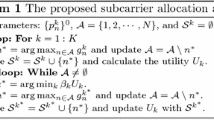Abstract
In uplink orthogonal frequency division multiplexing access (OFDMA) systems, efficient resource allocation can greatly improve system performance. Therefore, in this paper, we present a game-theoretical approach to achieve a joint subcarrier and power allocation in a distributed way. Particularly, the subcarrier allocation problem is modeled as a multi-player discrete, stochastic and finite strategy game, where each of the subcarriers is viewed as a player to choose the most satisfying user. The subcarriers of each user are allocated with equal power. For the proposed game model, on the one hand, we exploit the support and programming methods to obtain the Nash equilibriums, and analyze their theoretical properties. On the other hand, we propose a lowcomplexity algorithm based on the linear reward-inaction (LR-I) algorithm to search for the Nash equilibriums. And the relationship between the convergence results of this algorithm and the Nash equilibriums is discussed. Extensive simulation results demonstrate the effectiveness of the resource allocation game model and algorithm.
Similar content being viewed by others
References
Bohge M, Gross J, Wolisz A. Dynamic resource allocation in OFDM systems: an overview of cross-layer optimization principles and techniques. IEEE/ACM Trans Netw, 2007, 21: 53–59
Song G, Inc M, Li Y. Utility-based resource allocation and scheduling in OFDM-based wireless broadband networks. IEEE Commun Mag, 2005, 43: 127–134
Jang J, Lee K B. Transmit power adaptation for multiuser OFDM systems. IEEE J Sel Areas Commun, 2003, 21: 171–178
Sadr S, Anpalagan A, Raahemifar K. Ration resource allocation algorithms for the downlink of multiuser OFDM communication. IEEE Trans Surv Tutor, 2009, 11: 92–106
Wang J, Chen H, Chen M, et al. Cross-layer packet scheduling for downlink multiuser OFDM systems. Sci China Ser F-Inf Sci, 2009, 52: 2369–2377
Yu W, Rhee W, Cioffi J M. Iterative water-filling for Gaussian vector multiple access channels. IEEE Trans Inf Theory, 2004, 50: 145–151
Kim K, Han Y, Kim S. Joint subcarrier and power allocation in uplink OFDMA systems. IEEE Commun Lett, 2005, 9: 526–528
Jiang Y, Shen M, Zhou Y. Two-dimensional water-filling power allocation algorithm for MIMO-OFDM systems. Sci China Inf Sci, 2010, 53: 1242–1250
Yin H, Liu H. An efficient multiuser loading algorithm for OFDM-based broadband wireless systems. In: Proc IEEE GLOBECOM, San Francisco, 2000. 103–107
Shen Z, Andrews J G, Evans B L. Optimal power allocation in multiuser OFDM systems. In: Proc IEEE GLOBECOM, San Francisco, 2003. 337–341
Mohanram C, Bhashyam S. A sub-optimal joint subcarrier and power allocation algorithm for multiuser OFDM. IEEE Commun Lett, 2005, 9: 685–687
Chen Y, Chen J. A fast subcarrier, bit, and power allocation algorithm for multiuser OFDM-based systems. IEEE Trans Veh Tech, 2008, 57: 873–881
Mackenzie A, DaSilva L, Tranter W. Game Theory for Wireless Engineers. Morgan and Clatpool Publishers, 2006
Yang L, He Z, Wang L. A new utility based subcarrier and power joint allocation scheme in uplink OFDMA systems. In: Proc IEEE VTC, Dublin, 2007. 2756–2760
Wu D, Yu D, Cai Y. Subcarrier and power allocation in uplink OFDMA systems based on game theory. In: Proc IEEE ICNNSP, Zhenjiang, China, 2008. 522–526
Han Z, Ji Z, Liu K J R. Non-cooperative resource competition game by virtual referee in multi-cell OFDMA networks. IEEE J Sel Areas Commun, 2007, 25: 1079–1090
La Q D, Chew Y H, Boon-Hee S. An interference minimization game theoretic subcarrier allocation algorithm for OFDMA-based distributed systems. In: Proc IEEE GLOBECOM, Hawaii, 2009. 1–6
Yu D, Wu D, Cai Y, et al. Power allocation based on power efficiency in uplink OFDMA systems: A game theoretic approach. In: Proc IEEE ICCS, Guangzhou, 2008. 92–97
Luo Y. Game Theory. Beijing: Qinghua University Press & Beijing Traffic University Press, 2007
Economides A A. Multiple response learning automata. IEEE Trans Syst Man Cybern B, 1996, 26: 153–156
Oommen B J, Agache M. Continuous and discredited pursuit learning schemes: various algorithms and their comparison. IEEE Trans Syst Man Cybern B, 2001, 31: 277–287
Narendra K S, Thathachar M A L. Learning Automata: An Introduction. Englewood Cliffs: Prentice-Hall, 1989
Sastry P S, Phansalkar V V, Thathachar M A L. Decentralized learning of Nash equilibriums in multi-person stochastic games with incomplete information. IEEE Trans Syst Man Cybernet, 1994, 24: 769–777
Xing Y, Chandramouli R. Stochastic learning solution for distributed discrete power control game in wireless data networks. IEEE/ACM Trans Netw, 2008, 16: 932–944
Xing Y, Chandramouli R. Distributed discrete power control in wireless data networks using stochastic learning. In: Proc IEEE ICC, Paris, 2004
Paulraj A, Nabar R, Gore D. Introduction to Space-time Wireless Communications. Cambridge: Cambridge University Press, 2003
Zhang G. Computation Methods For Nonlinear Optimization. Beijing: Higher Education Press, 2005
Zhou L, Wang X, Tu W, et al. Distributed scheduling scheme for video streaming over multi-channel multi-radio multi-hop wireless networks. IEEE J Sel Areas Commun, 2010, 28: 409–419
Author information
Authors and Affiliations
Corresponding author
Rights and permissions
About this article
Cite this article
Wu, D., Cai, Y. & Sheng, Y. Joint subcarrier and power allocation in uplink OFDMA systems based on stochastic game. Sci. China Inf. Sci. 53, 2557–2566 (2010). https://doi.org/10.1007/s11432-010-4115-5
Received:
Accepted:
Published:
Issue Date:
DOI: https://doi.org/10.1007/s11432-010-4115-5




